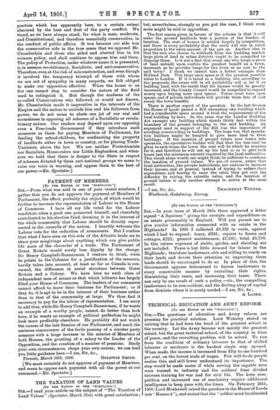THE TAXATION OF LAND VALUES. [TO THE EDITOR OF THE
"SPHOTATOR.".1 STE,—I read your article on the subject of "The Taxation of Land Values" (Spectator, March 31st) with great satisfaction ;
but, nevertheless, strongly as you put the case, I think even more might be said in opposition.
The first reason given in favour of the scheme is that it will make the ground landlords bear a portion of the burden of taxation. The rent of houses is settled largely by competition, and there is every probability that the rents will rise in exact proportion to the extra amount of tax put on. Another idea is that the rich who choose to withhold from the building market large plots of land in urban districts ought to be compelled to disgorge them. Is it not a fact that every one who keeps a piece of land unbuilt upon confers the greatest benefit on a town, inasmuch as he provides lungs for the town at no cost to the said town ? I think we cannot take a better example than Holland Park. This large open space is of the greatest possible value to London. If it is taxed as a building site, according to the proposals, the owner will in all probability sell or let it as building land, with the result that his income would be greatly increased, and the County Council would be compelled to expend money upon buying more open spaces. Towns must have open spaces, and if private individuals will provide them free of cost surely the town benefits.
There is another aspect of the question. In the last Session the House of lords passed a Bill exempting any building which had a considerable space around it from the requirements of the local building by-laws. In the same way the London Building Act exempts any building which stands thirty feet within the boundary of the ground belonging to the said building. An argument used in support of the Bill was the importance of avoiding overcrowding in buildings. The hope was that specula- tive builders might be tempted to give more land to their buildings. If the taxation of ground values ever comes into operation, the speculative builder will find that the less land he gives to each house the lower the rent will be which he requires for it, and therefore he will cut up his land so as to give each house just the minimum amount required by the local authorities. This result alone would, one might think, be sufficient to condemn the taxation of ground values. We are, of course, aware that local authorities, like private individuals, are anxious to increase their income, and at present, instead of trying to reduce their expenditure and fearing to raise the rates, they get over the difficulty by raising the rateable value, and the taxation of ground values is only another attempt to arrive at the same result.
—I am, Sir, &a., THACKERAY TURNER.
Westbrook, Goclalming, Surrey.






































 Previous page
Previous page